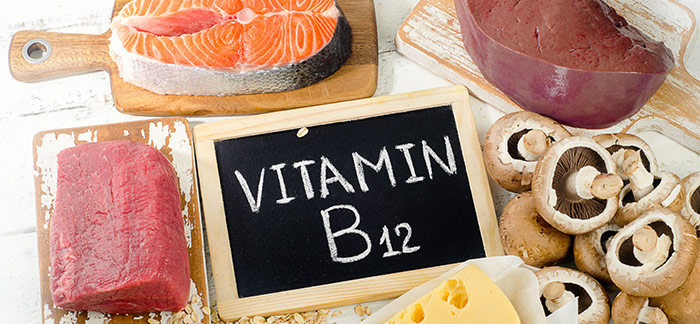|
Although our bodies cannot produce vitamin B12 on its own, it is a nutrient that helps prevent anemia and fatigue. It is critical you meet your daily B12 requirements since the body relies on a steady intake to make and repair DNA, to produce red blood cells and to keep your nervous system working properly. Vitamin B12 is also used to convert carbohydrates, proteins and fats in foods into energy compounds the body can use.
Vitamin B12 deficiency can occur in one of two ways, either your diet lacks adequate amounts of it, or your body is unable to fully absorb it from the food you eat.
|
|
All you need to do is turn to animal proteins to increase your natural intake of Vitamin B12. So, load your meals with beef, fish, poultry, eggs and dairy. Liver and kidneys, especially from lamb, are rich in vitamin B12. If you are a seafood lover then you are in luck as salmon, trout, tuna, clams and sardines are all a good source of B12.
Luckily for those on vegan diets, fortified foods can be good sources of this vitamin, including some varieties of bread and plant-based milk. Supplements are also a simple way to increase your intake. Most multivitamins contain Vitamin B12. In the case of a deficiency, vitamin B12 can be administered as a shot, or it is also available as a prescription medication in a nasal gel form that is sprayed into the nose. Nutritional yeast is also a good vegan source of protein, vitamins, and minerals.
It is important to note vitamin B12 can interact or interfere with other medicines that you may take, or in some cases, certain medicines can lower vitamin B12 levels in the body. Unfortunately, symptoms of a vitamin B12 deficiency can take years to show up, and diagnosing it can be complex so it is important to work with your doctor or healthcare providers about any dietary supplements which you would like to start taking.
Vitamin B12 might just be the magical cure you have been waiting for in your quest to overcoming some of the above conditions, if you are indeed experiencing any of these symptoms, in consultation with your doctor you should look into adding a supplement of vitamin B12 into your diet as soon as possible.
|

